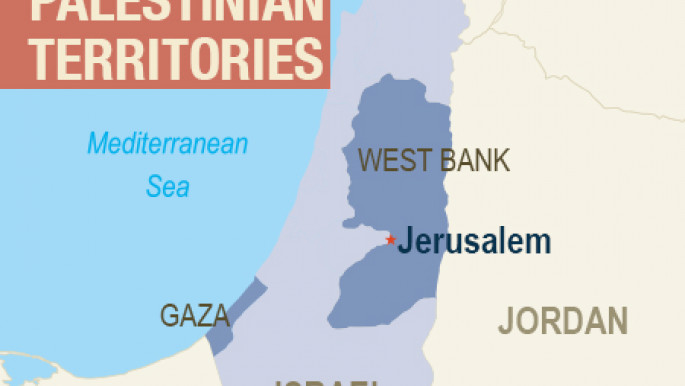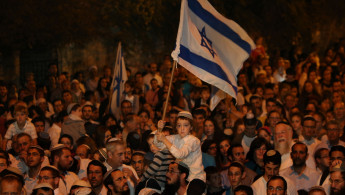Israeli opposition decries Netanyahu's 'leniency' with Palestinians
The hardliners accused the Israeli government of "incompetence" in dealing with Palestinian protesters in the West Bank and Jerusalem.
Religious and political leaders alike attended the protest, including those from within Netanyahu's own Likud party, underscoring the confusion of the Israeli establishment regarding how best to deal with what many say is the beginning of a new intifada.
The West Bank and Jerusalem are currently witnessing clashes, following attacks that caused both Israeli and Palestinian casualties, amid the frequent storming of al-Aqsa Mosque by Israelis, protected by the Israeli police.
 |
|
"We will act against the Islamic Movement which, together with Hamas and the Palestinian Authority, is the main source of incitement," said Netanyahu.
The prime minister's critics, most of whom are even further to the right of his government, are not impressed with the response of the Israeli government against Palestinians, which they see as not firm enough.
Earlier on Monday, Netanyahu said: "We are not prepared to give immunity to any rioter, inciter or terrorist anywhere; therefore, there are no restrictions on the action of our security forces."
Netanyahu's government has already deployed four extra battalions into the occupied West Bank, along with thousands of police in the Arab-majority part of Jerusalem.
Netanyahu also declared new measures meant to "deter attacks and rioters", but this does not go far enough for the political right, even as the Israeli government destroyed the homes of Palestinians behind attacks on Jewish settlers.
Chorus of criticism
Education Minister Naftali Bennett, in a swipe at the Netanyahu government of which he is part, called for full public and political support for soldiers in the field, the construction of new settlement neighbourhoods and the arrest of Palestinians released in former political deals.
Meanwhile, opposition leader Isaac Herzog (Zionist Union) said on Sunday that the government had no viable plan for "fighting a war against terror".
| Netanyahu's government has deployed extra battalions into the West Bank with thousands of police in Jerusalem |
In an interview with an Israeli newspaper, Herzog said: "Netanyahu and his government have failed miserably regarding the security situation, the cabinet's decisions are stale and contain nothing but the preservation of the existing situation."
Herzog said that, while the "perpetrators of violence" should be punished, a "political process" would also be required to prevent a third intifada.
"I support every step to smash terrorism. And I am for strong measures. The problem is that there is no horizon that can change the situation, such as the dramatic step of meeting with the King of Jordan, the president of Egypt and the Palestinian president," he added.
The controversial former foreign minister, Avigdor Lieberman - the head of the far-right Yisrael Beiteinu party - joined the ranks of Netanyahu critics, accusing him of going easy on the Palestinians and of repeating old policies without yet succeeding in deterring Palestinian "violence".
Lieberman said Israel should stop transferring funds to the Palestinian Authority in light of the "security incidents" in the West Bank and Jerusalem.
| Lieberman said Israel should stop transferring funds to the Palestinian Authority |
"We must stop all transfer of funds to the Palestinian Authority immediately and deprive its senior officials of the VIP cards which give them permits to cross checkpoints in Israel and other benefits," Lieberman said in a statement quoted by Israel National Radio Arutz Sheva.
He also called on the Israeli government to outlaw the northern branch of the Islamic Movement in Israel led by Sheikh Raed Salah, and to arrest "the persons hired for the purpose of escalating the situation at al-Aqsa Mosque".
Lieberman predicted that the government would not survive past this year.
According to Israeli media analysis, Netanyahu's small majority in the Israeli Knesset, as well as attacks from both sides of the political spectrum, make Netanyahu's position precarious, raising the question of what a third Palestinian intifada might mean for Israel's political establishment.



